 Heat, then, or that power which prevents the actual contact of the corpuscles of bodies, and which is the cause of our peculiar sensations of heat and cold, may be defined a peculiar motion, probably a vibration of the corpuscles of bodies, tending to... Heat, then, or that power which prevents the actual contact of the corpuscles of bodies, and which is the cause of our peculiar sensations of heat and cold, may be defined a peculiar motion, probably a vibration of the corpuscles of bodies, tending to...  The Theory of Heat - Page 43by Thomas Preston - 1894 - 719 pagesFull view The Theory of Heat - Page 43by Thomas Preston - 1894 - 719 pagesFull view - About this book
 | Geologists' Association - 1891 - 806 pages
...notion of repulsion is not altogether new. Sir Humphrey Davy, before any ot us were born, defined heat as " a peculiar motion, probably a vibration of the corpuscles of bodies tending it> separate them," and he called heat a " repulsive motion. "f These theories of the ultimate constitution... | |
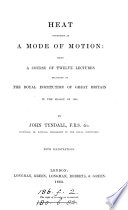 | John Tyndall - 1863 - 538 pages
...corpuscles of bodies, and which is the cause of our peculiar sensations of heat and cold, may be defined a peculiar motion, probably a vibration of the corpuscles of bodies, tending to separate them, it may with propriety be called the repulsive motion. Since there exists a repulsive motion, the particles... | |
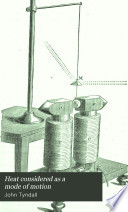 | John Tyndall - 1863 - 500 pages
...corpuscles of bodies, and which is the cause of our peculiar sensations of heat and cold, may be defined a peculiar motion, probably a vibration of the corpuscles of bodies, tending to separate them. It may with propriety be called the repulsive motion. Since there exists a repulsive motion, the particles... | |
 | 1864 - 560 pages
...corpuscles of bodies, and which is the cause of our peculiar sensations of heat and cold, may be defined a peculiar motion, probably a vibration, of the corpuscles of bodies, tending to separate them. It may with propriety be called the repulsive mo tion." " Bodies exist in different states, and these... | |
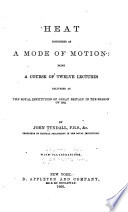 | John Tyndall - 1866 - 492 pages
...corpuscles of bodies, and which is the cause of our peculiar sensations of heat and cold, may be defined a peculiar motion, probably a vibration of the corpuscles of bodies, tending to separate them. It may with propriety be called the repulsive motion. Since there exists a repulsive motion, the particles... | |
 | 1866 - 646 pages
...corpuscles of bodies, and which is the cause of our peculiar sensations of heat and cold, may be defined a peculiar motion, probably a vibration of the corpuscles of bodies, tending to separate them. It may, with propriety, be called the repulsive motion." It is singular that, in spite of such authorities,... | |
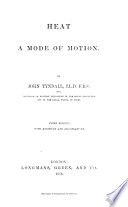 | John Tyndall - 1868 - 560 pages
...HEAT. 97 the corpuscles of bodies, and which is the cause of our peculiar sensations of heat and cold, may be defined as a peculiar motion, probably a vibration,...the corpuscles of bodies, tending to separate them. It may with propriety be called the repulsive motion. Since there exists a repulsive motion, the particles... | |
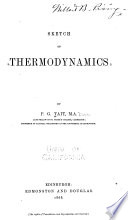 | Peter Guthrie Tait - 1868 - 148 pages
...corpuscles of bodies, and which is the cause of our peculiar sensations of heat and cold, may be defined a peculiar motion, probably a vibration, of the corpuscles of bodies, tending to separate them. It may with propriety be called the repulsive motion.' 10. Let us here remark, incidentally, what an... | |
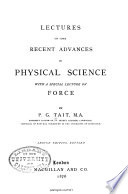 | Peter Guthrie Tait - 1876 - 420 pages
...contact of the corpuscles of bodies, and which is the cause of our own sensations of heat and cold, may be defined as a peculiar motion, probably a vibration...the corpuscles of bodies tending to separate them. It may with propriety be called the repulsive motion. Bodies exist in different states, and these states... | |
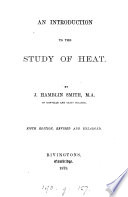 | James Hamblin Smith - 1878 - 108 pages
...contact of the corpuscles of bodies, and which is the cause of our own sensations of heat and cold, may be defined as a peculiar motion, probably a vibration...the corpuscles of bodies tending to separate them." 142. By the word corpuscles Davy names the minute particles, now called molecules, the smallest parts... | |
| |